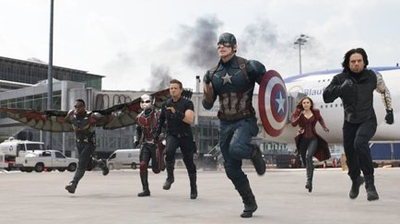Movie Review - Captain America: Civil War
By Matthew Huntley
May 16, 2016
BoxOfficeProphets.com

As good as the movie is, titling it Captain America: Civil War may be misleading. While Steve Rogers, a.k.a. Captain America (Chris Evans), does play a big part in it, Christopher Markus and Stephen McFeely’s screenplay, based on Mark Millar’s comics, lends fairly equal measure to several key players, including Tony Stark, a.k.a. Iron Man (Robert Downey Jr.); Natasha Romanoff, a.k.a. Black Widow (Scarlett Johansson); Bucky Barnes, a.k.a. Winter Soldier (Sebastian Stan); Wanda Maximoff (Elizabeth Olsen); and newcomer T’Challa, a.k.a. Black Panther (Chadwick Boseman). There are also Avengers regulars Falcon (Anthony Mackie), War Machine (Don Cheadle), Hawkeye (Jeremy Renner), Vision (Paul Bettany) and Ant-Man (Paul Rudd). Plus we get a visit from our friendly neighborhood Spider-Man (Tom Holland).
There are a lot of characters here, but somehow the directing team of Anthony and Joe Russo manages to give each of them presence when they’re on-screen. Granted, this is the 12th Marvel movie in eight years to feature at least some of these individuals, so we already know them fairly well and are aware of their powers and histories. But the film doesn’t assume it shouldn’t keep developing them beyond what we already know. The Avengers did this, too, but here’s it’s even more effective, probably because the drama and stakes of the plot have been raised.
Two main conflicts ensue in Civil War, with the first one focusing on whether an organization like the Avengers should have the liberty to operate at will and whether the group is doing more harm than good. Following the devastation that took place in New York in The Avengers, Washington, D.C. in Captain America: The Winter Soldier, Sokovia in Age of Ultron, and now the opening scene of Civil War, Secretary of State Thaddeus Ross (William Hurt) informs our heroes the United Nations has prepared the Sokovia Accords to keep them in check. Rogers is against the idea and believes it would inhibit the Avengers’ mission to effectively rid the world of evildoers, but Stark thinks it’s imperative in order to avoid any more catastrophes.
It was refreshing to watch a superhero movie that actually considers the implications of the violence caused by the characters. Batman v Superman did this to a degree, but Civil War is more creditable because the dialogue sounds like it might actually be spoken in a situation like this. We get the sense Civil War truly wants to raise the pros and cons and give the audience something to think about. The reason I say this is because it’s not clear with whom we should side; both Rogers and Stark make good points.
At the conference where the accords are to be signed, a bomb goes off that kills an African King and the suspect is Barnes, who’s presently in hiding. This ties in with the film’s second conflict, with Helmut Zemo (Daniel Brühl), an ex-military colonel from Zokovia, tracking down Barnes’ old Hydra master in order to learn the key words that trigger the Winter Soldier’s brainwashing. We suspect Zemo wants to manipulate Barnes and turn him into his own personal weapon, as well as awaken the other Winter Soldiers who are currently in a cryogenic sleep.
It would be easy to say Zemo simply wants to use his new army to take over the world, but that would be oversimplifying the plot. There’s a lot more to it than I’ve led on and one of the most appealing qualities of Civil War, or any good movie, is the way it grows richer in character, drama and complexity as it goes along. Despite it being a big-budget summer blockbuster, it’s not all about visual and aural sensation. These are omnipresent as usual, which is standard for the genre, but they seem to take a backseat to the moral and political issues the film brings up. It’s these dilemmas, and the motivations of the characters, that keep us on our toes and graduate the film beyond its typical category.
All this isn’t to say the movie isn’t also a ton of fun and one we can’t also enjoy as mindless summer escapism. Most of this comes courtesy of the movie’s stupendous action sequences, including one that ends with Captain America grabbing the end of a helicopter with one hand and holding onto the side of a building with the other. However, the most memorable is the battle between the opposing Avengers factions on an airport tarmac. Iron Man, Black Widow, War Machine, Vision, Black Panther and Spider-Man duke it out with Captain America, Falcon, Wanda, Winter Soldier and Hawkeye, and the fight becomes sort of a who’s who among superheroes, each of whom flaunt their powers and abilities. While this scene, and the rest of the movie, probably goes on for too long, it’s better to have too much of a good thing than anything lackluster.
And Captain America: Civil War certainly isn’t lackluster. It’s ambitious, inventive and exciting. It makes us think this franchise can go in all sorts of new and interesting directions. A friend of mine texted me saying he had seen the movie a second time in as little as two days and let me know it held up and delivered even more during the latter viewing. I can believe that, too, which is saying a lot about a superhero movie, which tends to lose its flavor fairly quickly. This could mean that Civil War is destined to join Superman: The Movie, Spider-Man 2 and Batman Begins as one of the greats, a genre picture that raises the bar and reminds us why so many of us adore the genre in the first place.